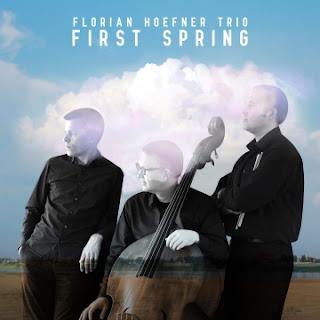The boundless empathy of the Matthew Shipp Trio is what’s most striking about the title track that opens Signature. Pianist Shipp, bassist Michael Bisio, and drummer Newman Taylor Baker first recorded as a unit in 2015 and again a year later, both times for the Thirsty Ear label, and they’ve established a searching, exploratory group identity. Their lope into the tune eases the listener into the graceful intensity of the music. Next up is Deep to Deep, just Bisio with his bow, pulling a dark sound from his bass for 47 seconds. The crackling Flying Saucer, with its quick-change dynamics, drum interjections, and left hand rumbling from Shipp, is a romp. Baker’s cymbal work is exceptionally fine on this one. The drummer’s turn in the solo spotlight comes with Snap, a two minute drum solo with Baker concentrating on his snare drum. The Way starts out with Shipp moving intricately through time and space. He’s then joined by throbbing bass from Bisio plus taps on drums, rims and cymbals by Baker. The trio proceeds to ponder the situation at length, with each musical gesture leading naturally to the next and yet remaining unpredictable in the richness of its details. It’s a winning and engaging performance. Stage Ten has a percolating R’n’B feel, with a sinuously convoluted melody and slightly aggressive drumming by Baker. There’s an added bonus of some prepared piano interjecting fresh colors. The ruminative Speech of Form has previously been recorded twice by the trio of Shipp, violist Mat Maneri, and bassist William Parker. In this unit’s hands, it becomes a sort of ballad, with Bisio and Baker playing quietly in support of Shipp’s peaceful meanderings. The busy and interactive Zo #2 reprises a tune that first appeared on Zo, a 1994 duet with William Parker on bass. Here, it becomes the occasion for some frisky and good-natured interplay. New Z is nearly four minutes of thoroughly mysterious sounds, with tinkling bells, rattles, cymbal crashes, and all sorts of nameless percussion. The relatively quiet aura of New Z sets the listener up for the long finale, This Matrix, which finds the trio in perfectly balanced form. The piece features a long and busy bass solo before Shipp returns to finish the track in a reflective mood. Shipp, who has played on scores of albums since his first recording in 1987, is always on the verge of bowing out of recording new material. So far, he’s always changed his mind. As the pianist’s long time collaborator William Parker once told liner note writer Mark Jacobson, Shipp “has a lot of ideas and he’s not shy about expressing them. The lucky thing is you want to hear what he has to say.” The always articulate Parker is, of course, totally correct, as he usually is when it comes to musical matters. Shipp is one of the great disrupters when it comes to creative music. He is always worth hearing, and the riveting Signature is no exception.
ESP-Disk’ ESP-5029; Matthew Shipp (p) Michael Bisio (b) Newman Taylor Baker (d); Brooklyn NY, July 9, 2018; Signature/ Deep to Deep/ Flying Saucer/ Snap/ The Way/ Stage Ten/ Speech of Form/ Zo #2/ New Z/ The Matrix; 62:23.
ESP-Disk’ ESP-5020; Thollem McDonas (p) André St. James (b) Tim DuRoche (d); Portland, OR, July 11, 2015; Persisted Resistance/ Reparation Apparition/ Sunshine Pipeline; 45:03.
Boundary is the initial release by the trio of Megumi Yonezawa, Masa Kamaguchi & Ken Kobayashi. Bassist Kamaguchi has the highest profile in the group. He first recorded in a group led by drummer Jimmy Weinstein in 1993. Since then, he’s worked with such notables as trumpeter Ahmed Abdullah, saxophonists John O’Gallagher and Sonny Simmons, and pianists Frank Kimbrough, Satoko Fujii, and Russ Lossing. Pianist Yonezawa has participated in five previous releases, notably with saxophonist Greg Osby on Public in 2004, while drummer Kobayashi has appeared on four sessions since his debut in 2006. The lead-off track, which gives the album its name, starts calmly with the resonance of a single piano note. A three-way musical conversation ensues that, ever so slowly, builds in intensity and density in an impressive display of improvisatory gusto. That’s the way that the trio rolls: starting simply and seeing where things lead. Typically, pianist Yonezawa sets the mood by herself, with bassist Kamaguchi usually joining in before drummer Kobayashi enters the fray. The fleet Meryon is a prime example of the power and grace exhibited by this impressively together trio. Another fast number, Wavelength, offers Kobayashi, an especially relaxed percussionist, a chance to cut loose. Only Onement fails to excite, getting on my nerves as it relies on a maniacally repeated piano note that made my head hurt. There is one standard peeking out from the set list, Sammy Fain and Irving Kahal’s 1938 song I’ll Be Seeing You. In their hands, this classic tune, familiar from famous versions by Frank Sinatra and Billie Holiday, becomes a vehicle for spacious piano from Yonezawa with sympathetically melodic playing by Kamaguchi and deftly understated drumming by Kobayashi. As pianist Matthew Shipp observes in his characteristically astute liner notes, this trio “sounds like they were destined to play together since time began ...,” which says a lot from someone with his impeccable credentials. Characterized by deep listening and instant reactions to the musical environment, Boundary is a fine example of the way that like-minded musicians create highly effective and enjoyable music by merely (merely!) setting up and playing. I’m in agreement with Shipp on this one: “Sit back and enjoy the ride.”
ESP-Disk’ ESP-5023; Megumi Yonezawa (p) Masa Kamaguchi (b) Ken Kobayashi (d); Brooklyn, NY, June 4, 2017; Boundary/ Alchemy/ Tremor/ Meryon/ I’ll Be Seeing You/ Reef/ Veil/ Onement/ Wavelength/ Nostalgio; 66:20. www.espdisk.com













